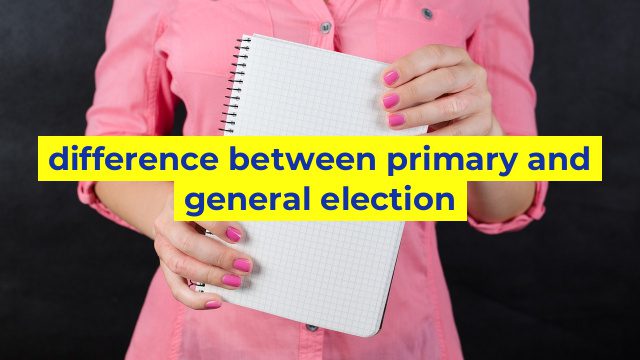Distinguishing Primary Election from General Election
What is a Primary Election?
A primary election is an election that allows different political parties to select their candidates to run for a particular office or position. In this type of election, voters have the opportunity to choose their preferred candidate from a list of candidates from the same political party. The winning candidate of a primary election goes on to represent their party in the general election.
What is a General Election?
A general election, on the other hand, is an election that allows voters to choose from a list of candidates from different political parties. This type of election is used to fill political offices or positions that are available to the public. The candidate who receives the most votes in the general election becomes the winner and takes up the political office or position being contested.
Key Differences between Primary and General Elections
The primary election and general election have several differences that every voter should be aware of. First, the primary election is internal to each political party, while the general election is open to all voters. Second, in a primary election, candidates run within their respective political parties, while in a general election, candidates run across different parties. Third, primary elections are held before the general election so that each party can choose their representative for the position.
The Importance of Primary and General Elections
Primary and general elections play a significant role in the political process of all democracies. The primary election allows the political parties to choose the best candidate to represent them in the general election. The general election, on the other hand, allows voters to select their preferred candidate to hold a particular political office or position. These elections offer citizens the opportunity to influence how their country or state is run and can determine the direction of their communities.
In conclusion, while the primary and general elections are distinct, they have vital roles in the overall democratic process. Understanding the distinction between these two types of elections is essential for exercising your voting rights and protecting the integrity of the electoral process.
Table difference between primary and general election
| Primary Election | General Election |
|---|---|
| A preliminary election where voters choose a party nominee to represent them in the general election | An election where voters choose between candidates from various parties for elected offices |
| Usually held in the spring or summer of an election year | Held in the fall of an election year, usually the first Tuesday after the first Monday in November |
| Open primaries allow voters to choose which party’s primary to vote in regardless of their own party affiliation | Open general elections do not require party affiliation to vote, meaning any registered voter can participate |
| Closed primaries only allow voters registered with a particular party to participate | Closed general elections are not common, and usually only allow voters registered with a particular party to participate in that party’s primary |
| Winner of the primary goes on to represent their party in the general election | Winner of the general election takes office as the elected official, representing all eligible voters within their jurisdiction |


